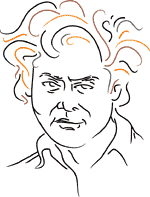
Went to see the launch last night in the Goethe-Institut of Der Alte Mann by Günter Kunert translated into English by Hans-Christian Oeser and into Irish by Gabriel Rosenstock. The book is part of a series of trilingual poetry collections published by the Irish language house Coiscéim. Kunert is one of Germany’s leading post-war poets. He was born in Berlin in 1929 and as a ‘Mischling’ (of mixed decent – his mother was Jewish) was deemed unfit to finish his secondary schooling or serve in the German army during the war. After the war he lived in the GDR, but after signing a petition in 1976 against the state’s stripping of Wolf Biermann’s citizenship he subsequently lost his party membership, and was allowed to leave the GDR in 1979. As well as poetry he has written short stories, novels, television plays and screenplays. Poetry translations in English include three poems in Michael Hamburger’s German Poetry 1910-1975 (Carcanet, 1976), several poems in Charlotte Melin’s German Poetry in Transition 1945-1990 (University Press of New England, 1999) and three in Michael Hofmann’s The Faber Book of 20th Century Poems (2005). He is also one of four poets represented in Agnes Stein’s Four German Poets (Red Dust, 1979) – the others are Günter Eich, Hilde Domin and Erich Fried.
Brecht was a big influence on Kunert (two of his poems to Brecht are translated by Karen Leeder in her After Brecht: A Celebration, published by Carcanet last year), and this is evident in the pared down, laconic style of the work as well as its scepticism and irony. Here's a well known postwar poem in original and translation which gives a sense of his style:
Über einige Davongekommene
Als der Mensch
Unter der Trümmern
Seines
Bombardierten Hauses
Hervorgezogen wurde,
Schüttelte er sich
Und sagte:
Nie wieder.
Jedenfalls nicht gleich.
About some who survived
As the man
Was dragged from the ruins
Of his bombed out house,
He dusted himself down
And said
Never again.
At least not right away.
And another well known poem, ‘Film Put in Backwards’, in Christopher Middleton’s translation
When I woke
I woke in the breathless black
Of the box.
I heard: the earth
Was opening over me. Clods
Fluttered back
To the shovel. The
Dear box, with me the dear
Departed, gently rose.
The lid flew up and I
Stood, feeling:
Three bullets travel
Out of my chest
Into the rifles of soldiers, who
Marched off, gasping
Out of the air a song
With cam firm steps
Backwards.
Der Alte Mann spricht mit seiner Seele is a sustained reflection on old age, full of grim humour:
THE OLD MAN
considers his toes. How fast
my nails are growing. Regular
claws. Is that abnormal or
is it biological fact? If only
the same happened to the hair
on your head, you’d have
a mane. Like Beethoven.
But then you’d be deaf!
Ergo: let’s go for the nails.
The translators’ notes at the back are a very useful (and all too rare) feature and show the extent to which the translation challenge is heightened by the allusiveness of the poems; they constantly and often playfully engage with German tradition in a way that can make them difficult to translate. Here are a few lines to illustrate the challenge:
Nikolaus Copernicus, der
polnische Schlawiner, stahl
mit die Zuversicht
ins göttliche Universum. Da steh’
ich nun, ich Armer Tor,
und bin bloß ärmer als zuvor.
Nicholas Copernicus,
that Polish rogue, robbed
me of my trust in a
universe divine. And here
I stand, with all my lore,
poor fool, just poorer than before.
The note to this points out that the final lines in the German directly quote the opening of Goethe’s Faust: ‘Da steh ich nun, ich armer Tor,/und bin so klug als wie zuvor !’ – ‘And here I stand, with all my lore,/Poor fool, no wiser than before.’
Here's one of the poems in the original followed by two translations, to give a flavour of this trilingual book.
DER ÄLTE MANN
blättert in seinen Telefonverzeichnis.
Alles Nummern von Toten. Wie
erreiche ich euch, Freunde.
Die Drähte sind gekappt, die
Sargdeckel versiegelt. Meine Stimme
dringt nicht mehr durch
in den ewigen Frieden. Mit
Antworten rechne ich nicht mehr.
Eure Fotos schweigen herzlich.
Als Schatten treffen wir uns
wieder einmal, ohne daß die
einander etwas zu sagen hätten:
Als daß wir uns
im Hades so verlassen fühlen
wie zu Lebzeiten.
THE OLD MAN
leafs through his address book.
All those numbers of the dead. How
can I reach you, friends?
The wires are cut, the
coffin lids sealed. My voice
no longer penetrates
the everlasting peace. No
more do I anticipate replies.
Your photograph keeps a cheery silence.
One day we shall meet again
as shadows with nothing
to say to each other:
Except that in Hades
we feel as abandoned
as we felt when alive.
AN SEANÓIR
is é ag gabháil trína leabhar seoltaí.
Uimhreacha uile na marbh. Conas
teacht oraibh, a chairde?
Gearradh na sreanganna, séalaíodh
na cónraí. Ní thollann
mo ghuthsa a thuilleadh
an tsíocháin shíoraí. Nílim
ag súil le freagraí níos mó.
Is binn bhur ngrianghraif ina dtost.
Casfar ar a chéile arís sinn
lá breá éigin inár scáthanna dúinn
is gan faic le rá againn
ach amháin in Háidéas
go mbraithimid chomh tréigthe
is a bhraitheamar nuair a bhíomar beo.
Günter Kunert, Der Alte Mann/The Old Man/An Seanóir. Translated into English by Hans-Christian Oeser. Gabriel Rosenstock a d’aistrigh go Gaeilge. Coiscéim.

